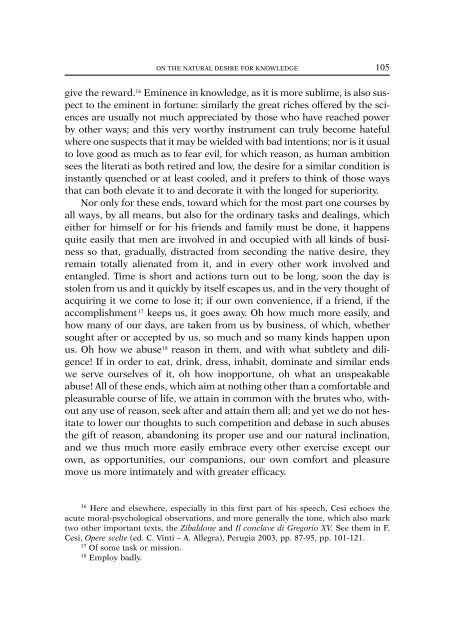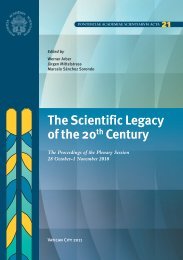ON THE NATURAL DESIRE FOR KNOWLEDGE 105give the reward. 16 Eminence in knowledge, as it is more sublime, is also suspectto the eminent in fortune: similarly the great riches <strong>of</strong>fered by the sciencesare usually not much appreciated by those who have reached powerby other ways; and this very worthy instrument can truly become hatefulwhere one suspects that it may be wielded with bad intentions; nor is it usualto love good as much as to fear evil, for which reason, as human ambitionsees the literati as both retired and low, the desire for a similar con<strong>di</strong>tion isinstantly quenched or at least cooled, and it prefers to think <strong>of</strong> those waysthat can both elevate it to and decorate it with the longed for superiority.Nor only for these ends, toward which for the most part one courses byall ways, by all means, but also for the or<strong>di</strong>nary tasks and dealings, whicheither for himself or for his friends and family must be done, it happensquite easily that men are involved in and occupied with all kinds <strong>of</strong> businessso that, gradually, <strong>di</strong>stracted from secon<strong>di</strong>ng the native desire, theyremain totally alienated from it, and in every other work involved andentangled. Time is short and actions turn out to be long, soon the day isstolen from us and it quickly by itself escapes us, and in the very thought <strong>of</strong>acquiring it we come to lose it; if our own convenience, if a friend, if theaccomplishment 17 keeps us, it goes away. Oh how much more easily, andhow many <strong>of</strong> our days, are taken from us by business, <strong>of</strong> which, whethersought after or accepted by us, so much and so many kinds happen uponus. Oh how we abuse 18 reason in them, and with what subtlety and <strong>di</strong>ligence!If in order to eat, drink, dress, inhabit, dominate and similar endswe serve ourselves <strong>of</strong> it, oh how inopportune, oh what an unspeakableabuse! All <strong>of</strong> these ends, which aim at nothing other than a comfortable andpleasurable course <strong>of</strong> life, we attain in common with the brutes who, withoutany use <strong>of</strong> reason, seek after and attain them all; and yet we do not hesitateto lower our thoughts to such competition and debase in such abusesthe gift <strong>of</strong> reason, abandoning its proper use and our <strong>natural</strong> inclination,and we thus much more easily embrace every other exercise except ourown, as opportunities, our companions, our own comfort and pleasuremove us more intimately and with greater efficacy.16 Here and elsewhere, especially in this first part <strong>of</strong> his speech, Cesi echoes theacute moral-psychological observations, and more generally the tone, which also marktwo other important texts, the Zibaldone and <strong>Il</strong> conclave <strong>di</strong> Gregorio XV. See them in F.Cesi, Opere scelte (ed. C. Vinti – A. Allegra), Perugia 2003, pp. 87-95, pp. 101-121.17 Of some task or mission.18 Employ badly.
106DEL NATURAL DESIDERIO DI SAPERESono molti che, per nativo temperamento <strong>di</strong> complessione 19 o pervaria <strong>di</strong>spositione de’ corporei strumenti, 20 nascono meno atti a secondarquesto affetto, o pur in esso tepi<strong>di</strong>. È questo <strong>di</strong>fetto <strong>di</strong> natura, ma è <strong>di</strong>fettoanco tal volta <strong>di</strong> volontà in quanto potrebbono aiutarsi. A’ mancamentidella sanità, dell’ingegno, della memoria non mancano reme<strong>di</strong>; è peròmolto più facile e solito il trascurarli, e tanto quanto è <strong>di</strong>fficile il repugnaralla constitution <strong>natural</strong>e. È perciò minor meraviglia se questi tali, chenon sono pochi, non sorgono a’ gra<strong>di</strong> del <strong>sapere</strong>, e devono esserne menoincolpati, mentre maggior aiuto, tempo e fatiga li è <strong>di</strong> bisogno che agl’altri,et in sé stessi ne hanno molto più debole appetito.Alle cagioni dette, che sono totalmente per parte 21 e colpa nostra,aggiongiamo hora quelle che dalle stesse con<strong>di</strong>tioni della dottrina, e mo<strong>di</strong><strong>di</strong> essa, provengono, e par che nel picciol numero de’ dotti ne scusinoalquanto. 22 Che habbia in sé l’acquisto delle scienze, parimente con tuttel’altre gran<strong>di</strong> e lodevoli imprese, <strong>di</strong>fficultà gran<strong>di</strong>ssima, è pur troppo notoet evidente. Difficultà per la fatiga, per il tempo e per l’assiduità, cheesquisitamente vi si ricercano, e vogliono l’huomo tutto; <strong>di</strong> più per la qualitàe bisogni della vita nostra, che molte volte si contrapongono. 23 È certoche nove guide sono necessarie alli stu<strong>di</strong>osi, secondo Ficino: 24 tre celesti,Mercurio, Febo et Venere; tre dell’animo nostro, voluntà stabile et ardente,acutezza d’ingegno, memoria tenace; tre in terra, prudente padre <strong>di</strong>famiglia, buon maestro, buon me<strong>di</strong>co; a molti tutte, a molti per la maggiorparte si vedono mancare; né possiamo ad arbitrio nostro venir d’altraprovisti che della volontà stessa, nella quale per nostro <strong>di</strong>fetto, come<strong>di</strong> sopra, 25 sogliamo errare.Ricerca lo stu<strong>di</strong>o stesso i maestri che con la voce viva ci insegnino,ricerca i libri che più pienamente tutte le materie <strong>di</strong>scuoprano e ci communichinol’altrui contemplationi e fatighe; quelli con più maniere, parole19 Complessione umorale, secondo la dottrina antica <strong>di</strong> tanta fortuna nel Rinascimento.20 Organi.21 Dal nostro lato <strong>di</strong> responsabilità: si ricor<strong>di</strong> quanto Cesi si era chiesto: se lo scarsoimpegno nella ricerca del <strong>sapere</strong> fosse da addebitare al campo stesso, troppo arduo,della conoscenza, o a noi, che dovremmo indagare.22 Rappresentino un’attenuante per lo scarso numero dei dotti.23 Alle esigenze, appena richiamate, della ricerca.24 De vita, I, I.25 Come è stato esposto <strong>di</strong> sopra.
- Page 1 and 2:
THE PONTIFICALACADEMY OFSCIENCESExt
- Page 3 and 4:
Address:The Pontifical Academy of S
- Page 5 and 6:
ISBN 88-7761-083-2© Copyright 2003
- Page 7 and 8:
Quest’edizione del Proponimento e
- Page 9 and 10:
FEDERICO CESI, LA PRIMA ACCADEMIA,
- Page 11 and 12:
10FEDERICO CESI, LA PRIMA ACCADEMIA
- Page 13 and 14:
12FEDERICO CESI, LA PRIMA ACCADEMIA
- Page 15 and 16:
14FEDERICO CESI, LA PRIMA ACCADEMIA
- Page 17 and 18:
16FEDERICO CESI, LA PRIMA ACCADEMIA
- Page 19 and 20:
18FEDERICO CESI, LA PRIMA ACCADEMIA
- Page 21 and 22:
20FEDERICO CESI, LA PRIMA ACCADEMIA
- Page 23 and 24:
22FEDERICO CESI, LA PRIMA ACCADEMIA
- Page 25 and 26:
24FEDERICO CESI, LA PRIMA ACCADEMIA
- Page 27 and 28:
26FEDERICO CESI, LA PRIMA ACCADEMIA
- Page 29 and 30:
28FEDERICO CESI, LA PRIMA ACCADEMIA
- Page 31 and 32:
30FEDERICO CESI, LA PRIMA ACCADEMIA
- Page 33 and 34:
32FEDERICO CESI, LA PRIMA ACCADEMIA
- Page 35 and 36:
34FEDERICO CESI, LA PRIMA ACCADEMIA
- Page 37 and 38:
36FEDERICO CESI, LA PRIMA ACCADEMIA
- Page 39 and 40:
38FEDERICO CESI, LA PRIMA ACCADEMIA
- Page 41 and 42:
40FEDERICO CESI, LA PRIMA ACCADEMIA
- Page 43 and 44:
42FEDERICO CESI, LA PRIMA ACCADEMIA
- Page 45 and 46:
44FEDERICO CESI, LA PRIMA ACCADEMIA
- Page 47 and 48:
46FEDERICO CESI, LA PRIMA ACCADEMIA
- Page 49 and 50:
48FEDERICO CESI, LA PRIMA ACCADEMIA
- Page 51 and 52:
50FEDERICO CESI, LA PRIMA ACCADEMIA
- Page 53 and 54:
52FEDERICO CESI, LA PRIMA ACCADEMIA
- Page 55 and 56: 54FEDERICO CESI, LA PRIMA ACCADEMIA
- Page 57 and 58: 56FEDERICO CESI, LA PRIMA ACCADEMIA
- Page 59 and 60: 58FEDERICO CESI, LA PRIMA ACCADEMIA
- Page 61 and 62: 60FEDERICO CESI, LA PRIMA ACCADEMIA
- Page 63 and 64: 62FEDERICO CESI, LA PRIMA ACCADEMIA
- Page 65 and 66: 64FEDERICO CESI, LA PRIMA ACCADEMIA
- Page 67 and 68: 66FEDERICO CESI, LA PRIMA ACCADEMIA
- Page 69 and 70: 68FEDERICO CESI, LA PRIMA ACCADEMIA
- Page 72 and 73: FEDERICO CESI, THE FIRST ACADEMY, A
- Page 74 and 75: FEDERICO CESI, THE FIRST ACADEMY, A
- Page 76 and 77: FEDERICO CESI, THE FIRST ACADEMY, A
- Page 78 and 79: FEDERICO CESI, THE FIRST ACADEMY, A
- Page 80 and 81: FEDERICO CESI, THE FIRST ACADEMY, A
- Page 82 and 83: FEDERICO CESI, THE FIRST ACADEMY, A
- Page 84 and 85: FEDERICO CESI, THE FIRST ACADEMY, A
- Page 86 and 87: FEDERICO CESI, THE FIRST ACADEMY, A
- Page 88 and 89: BIOGRAPHICAL NOTEFederico Cesi (158
- Page 90 and 91: LYNCEAN RESOLUTION 1That precept, s
- Page 92 and 93: CONDENSED LYNCEAN CONSTITUTIONS 1So
- Page 94 and 95: CONDENSED LYNCEAN CONSTITUTIONS 93h
- Page 96 and 97: CONDENSED LYNCEAN CONSTITUTIONS 95I
- Page 98 and 99: CONDENSED LYNCEAN CONSTITUTIONS 97I
- Page 100 and 101: ON THE NATURAL DESIRE FOR KNOWLEDGE
- Page 102 and 103: ON THE NATURAL DESIRE FOR KNOWLEDGE
- Page 104 and 105: ON THE NATURAL DESIRE FOR KNOWLEDGE
- Page 108 and 109: ON THE NATURAL DESIRE FOR KNOWLEDGE
- Page 110 and 111: ON THE NATURAL DESIRE FOR KNOWLEDGE
- Page 112 and 113: ON THE NATURAL DESIRE FOR KNOWLEDGE
- Page 114 and 115: ON THE NATURAL DESIRE FOR KNOWLEDGE
- Page 116 and 117: ON THE NATURAL DESIRE FOR KNOWLEDGE
- Page 118 and 119: ON THE NATURAL DESIRE FOR KNOWLEDGE
- Page 120 and 121: ON THE NATURAL DESIRE FOR KNOWLEDGE
- Page 122 and 123: ON THE NATURAL DESIRE FOR KNOWLEDGE
- Page 124 and 125: ON THE NATURAL DESIRE FOR KNOWLEDGE
- Page 126 and 127: ON THE NATURAL DESIRE FOR KNOWLEDGE
- Page 128 and 129: ON THE NATURAL DESIRE FOR KNOWLEDGE
- Page 130 and 131: ON THE NATURAL DESIRE FOR KNOWLEDGE
- Page 132 and 133: ON THE NATURAL DESIRE FOR KNOWLEDGE
- Page 134 and 135: ON THE NATURAL DESIRE FOR KNOWLEDGE
- Page 136 and 137: ON THE NATURAL DESIRE FOR KNOWLEDGE
- Page 138 and 139: ON THE NATURAL DESIRE FOR KNOWLEDGE
- Page 140 and 141: ON THE NATURAL DESIRE FOR KNOWLEDGE
- Page 142 and 143: ON THE NATURAL DESIRE FOR KNOWLEDGE
- Page 144 and 145: ON THE NATURAL DESIRE FOR KNOWLEDGE
- Page 146 and 147: ON THE NATURAL DESIRE FOR KNOWLEDGE
- Page 148 and 149: ON THE NATURAL DESIRE FOR KNOWLEDGE
- Page 150 and 151: ON THE NATURAL DESIRE FOR KNOWLEDGE
- Page 152 and 153: ON THE NATURAL DESIRE FOR KNOWLEDGE
- Page 154 and 155: ON THE NATURAL DESIRE FOR KNOWLEDGE
- Page 156 and 157:
ON THE NATURAL DESIRE FOR KNOWLEDGE
- Page 158:
ON THE NATURAL DESIRE FOR KNOWLEDGE
















